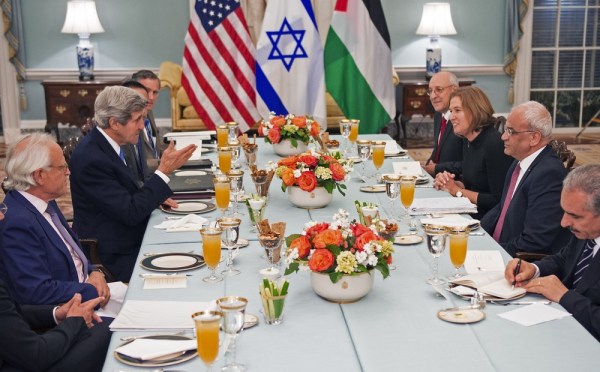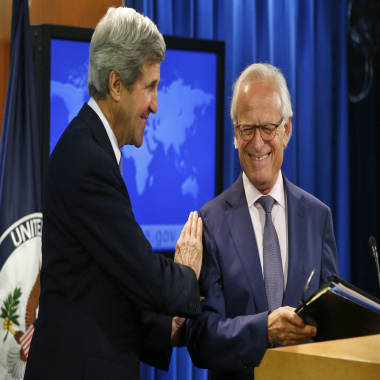
Paul J. Richards / AFP - Getty Images
Secretary of State John Kerry (center-left) hosts a dinner with Israeli Justice Minister Tzipi Livni (right 2nd from end) and Palestinian chief negotiator Saeb Erakat (3rd) in the Thomas Jefferson Room of the Department of State Monday.
By Erin McClam, Staff Writer, NBC News
For the first time in almost three years, Israelis and Palestinians are meeting face to face for peace talks. Foreign policy analysts say a comprehensive deal will be extremely difficult to achieve, but there is room for agreement on some issues.
The talks opened with a dinner Monday night in Washington and get underway in earnest on Tuesday. They?re expected to last nine months. Here?s what you need to know about the latest peace process.
Why now?
Plans for the talks fell into place after Israel agreed to release about 100 of the thousands of Palestinian prisoners who are in Israeli jails.
Former U.S. ambassador to Israel, Martin Indyk, will guide the Mideast peace talks, aiming to establish a Palestinian state alongside Israel and to find agreement on borders and security. NBC's Brian Williams reports.
Many of them have been behind bars for two decades, convicted of attacks against Israel before the Israeli-Palestinian talks of 1993. They are to be released in stages over several months, depending on progress in the talks.
What are the odds that something will get done?
Much better for the earlier rounds of the talks than the later. In Washington, the two sides will start with the basics of future meetings ? the where and how. But there were signs Monday that the two sides don?t even agree on which topics should be addressed when.
Later talks, to be held in the Middle East, will deal with the real questions.
Among them: What would the borders of a Palestinian state be? How might Jerusalem be divided? What happens to the millions of people who are descended from Palestinians that were driven from their homes when Israel was created, and who want to return?
Any breakthrough will depend not just on compromise but on mutual trust, said Aaron David Miller, a vice president at the Woodrow Wilson International Center for Scholars who has advised U.S. presidents of both parties on the conflict.
And the level of trust today? ?I wouldn?t say it?s subzero, but it?s not great,? he said.
Are they close to a deal on anything?
If the two sides find common ground, it might be on the borders of a future Palestinian state or a security arrangement, some analysts say. The gaps on those two matters are still wide, but it?s conceivable that they could be closed.
Martin Indyk was tapped to lead new round of Israeli-Palestinian peace talks. NBC News' Steve Handelsman reports.
For example: The Palestinians want the West Bank, where an estimated 360,000 Israeli settlers live. Most of them could be annexed into Israel with small changes to the map, in exchange for equal land that Israel would give to the Palestinians.
But Prime Minister Benjamin Netanyahu is a hawk on the border issue, partly because it could put Palestinians within rocket range of key Israeli targets.
?He may surprise us,? said Natan Sachs, a fellow at the Saban Center for Middle East Policy, part of the Brookings Institution. ?We should hope he does.?
On the Jerusalem and refugee questions, the politics back home for both sides are extremely tough, and there?s little or no leeway, Miller said. As for how far apart they are on those issues, ?Think about the Grand Canyon,? he said.
How is this playing in Israel and among Palestinians?
Polls have shown that sizable majorities of Israelis and Palestinians want a so-called two-state solution. As you might expect, though, the politics are dicey in both cases.
The Israeli cabinet voted 13-7 to release the prisoners, but Netanyahu faces opposition within his own conservative party, Likud, and from further to the right. He may have room to maneuver by shunning the far right and seeking cooperation to his left, Sachs said.
Meanwhile, Palestinian protesters clashed with police over the weekend in the West Bank. One of the chants recited by protesters held that the Palestinian cause ?will never be resolved except by the rifle.?
What is the American role?

Charles Dharapak / AP
Secretary of State John Kerry with Martin Indyk, special envoy for the talks.
It took an intense effort by Secretary of State John Kerry to get the Israelis and Palestinians to the table. He said Monday that he was seeking ?reasonable compromises? in the talks but was under no illusions about the challenge.
?If it were easy, it would have happened a long time ago,? he said.
Experts on the conflict say that President Barack Obama will probably have to get more deeply involved to achieve a comprehensive deal, and they say he?ll only do it if he believes Kerry?s team has gotten them close enough.
Who?s going to be at the table?
For the Palestinians, their chief negotiator, Saeb Erekat, and an aide to President Mahmoud Abbas, Mohammed Shtayyeh.
For the Israelis, Justice Minister Tzipi Livni and an adviser, Yitzhak Molcho.
The United States will be represented by Martin Indyk, a two-time American ambassador to Israel who now leads the foreign policy program at Brookings.
On Monday, Kerry named Indyk special envoy to the region, a title giving him broad responsibility as the administration?s point man. That will include a seat at the bargaining table ? though if he spends too much time there, it could be a bad sign.
Presidents name special envoys regularly. Most Americans learned Paul Bremer?s name when President George W. Bush named him special envoy to Iraq in 2003. The late Richard Holbrooke was special envoy to Pakistan and Afghanistan, where he pressed President Hamid Karzai to clean up his government.
Indyk was a student in Israel during the Yom Kippur war of 1973. He said the challenge was humbling, but not impossible.
?It?s been my conviction for 40 years,? he told reporters, ?that peace is possible.?
The Associated Press and Reuters contributed to this report.
Related:
This story was originally published on Mon Jul 29, 2013 8:19 PM EDT
Olympics Live Mens Gymnastics Allison Schmitt Olympic Schedule Kyla Ross Montenegro Olympic Games
No comments:
Post a Comment
Note: Only a member of this blog may post a comment.